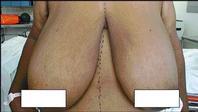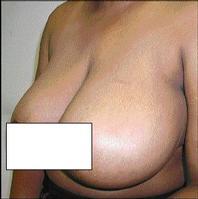

A before, left, and after case involving breast reduction surgery.
-Contributed photos
Alicia Roache, Staff Reporter
ONCE UPON a time it used to be that plastic surgery was a luxury reserved only for the idle rich. But it has come to pass in this modern day of globalisation and cable TV that mental and social barriers no longer prevent people from appreciating the aesthetic value of the plastic surgeon's job.
In Jamaica, cosmetic surgery is becoming increasingly popular. According to Dr. Guyan Arscott, one of Jamaica's cosmetic and reconstructive surgeons, the increase in the number of plastic surgeons from two in the 1960s to six working in the island today is indicative of the growing acceptance of, and demand for, plastic surgery.
Dr. Arscott, who has been practising for over 15 years in Jamaica, says that the attitude towards plastic surgery has changed over the years to reflect more tolerance and acceptance of its benefits.
In addition, he says, the cost of surgery for some procedures is comparable to that of any other surgical procedure, which in part makes it more affordable for persons from any social class.
According to Dr. Arscott, "Awareness and information from medical literature and the media" about the types of surgery that are available may have contributed to more people going under the knife.
But is cosmetic surgery becoming a high priced beauty tool? One of the most popular procedures done in Jamaica is breast augmentation (breast implant). The price of a silicone implant can range from between US$1,200 to US$1,500, and then there is the cost of surgery, hospital stay and after care, all of which the surgeon usually includes in his overall charge. Surgery can run between J$45,000 and J$300,000, depending on the operation to be carried out. Of course, as plastic surgery is not covered by health insurance, the patient will usually have to foot their entire bill.
If you want to take an exotic vacation and have eyelid surgery and a face-lift done at the same time, then the Half Moon Club in Montego Bay is the latest in a series of safari and surgery vacations available around the world.
Dr. Z. Paul Lorenc, a surgeon from the upscale Park Avenue in New York, hosts 'Aesthetic Surgery Vacations and Medi Spa Weekends' at Half Moon and MoBay's 'First World, state-of-the-art facility' Hope Medical Centre.
There, he treats patients to the new 'R&B' Restylane and Botox non-surgical, non-permanent injectable, anti-wrinkle treatments. Locally-based surgeons offer the same treatments, but Dr. Lorenc's 'Sun, Fun and Plastic Surgery' treatments are immensely popular with wealthy Americans and, to a smaller extent, Jamaicans.
Dr. Lorenc's prices for Botox treatments range from US$500 to US$1400, depending on the number of facial areas treated. The 'Botox Weekends' at Half Moon started three years ago, and both Dr. Lorenc and Judy Farmer, assistant administrator at MoBay Hope, confirmed that the practice has grown tremendously.
Although Dr. Lorenc has only three Jamaican patients Farmer suggests that many more will come. "There are Jamaicans who can more than afford it," she said.
Dr. Lorenc says his practice has doubled within the two years he has been established in Montego Bay.
NOT JUST VANITY
While many may see this as an indication of the wealthy pampering themselves, Dr. Arscott suggests that cosmetic surgery is not just about vanity and remaining beautiful at whatever cost. Sometimes a patient can be so affected by a personal feature that it lowers their self-esteem.
Gynecomastia, commonly called 'woman breast', is a condition in which the male's breast tissue enlarges to sizes comparable to a female's and can sometimes go as far down as waist length, says Dr. Arscott. This condition can affect men of all ages. In such cases, surgery may be the only solution and may improve quality of life, rather than just physical appearance.
Women who have been ravaged by pregnancy, cancer treatments and have abnormalities can also benefit from plastic surgery, which Dr. Arscott says often "improves the self-image and confidence tremendously", as surgery can correct asymmetrical problems and reshape deformed breasts.
In order to determine who qualifies for plastic surgery, consultation is key. Potential patients are interviewed to determine their medical and psychological readiness for the procedure and to ensure that they have realistic expectations of what they want to achieve post-surgery.
For example, liposuction, says Dr. Arscott, is for silhouette and contouring, rather than weight reduction.
"Some patients need to be protected from themselves," he said. "They may have unrealistic expectations and our job is to educate them. We have had patients we have had to turn away, much to their disgust."
Even so, the attitude in Jamaica to plastic surgery has undergone tremendous change, as people have become more accepting of the idea and are now talking about it.
Mellisa Jones (not her real name), 24, says she would have a breast augmentation surgery done to prop up her bustline. When she was told the cost of surgery she quickly calculated how many Jamaican dollars she would need to get it done. "I'm going to start saving for my implants," she said.
However, the attitude may not have completely shifted.
According to Dr. Lorenc, "overseas patients are more accepting of the concept of aesthetic surgical enhancement, because they have had more exposure to information about the various procedures available today."

















